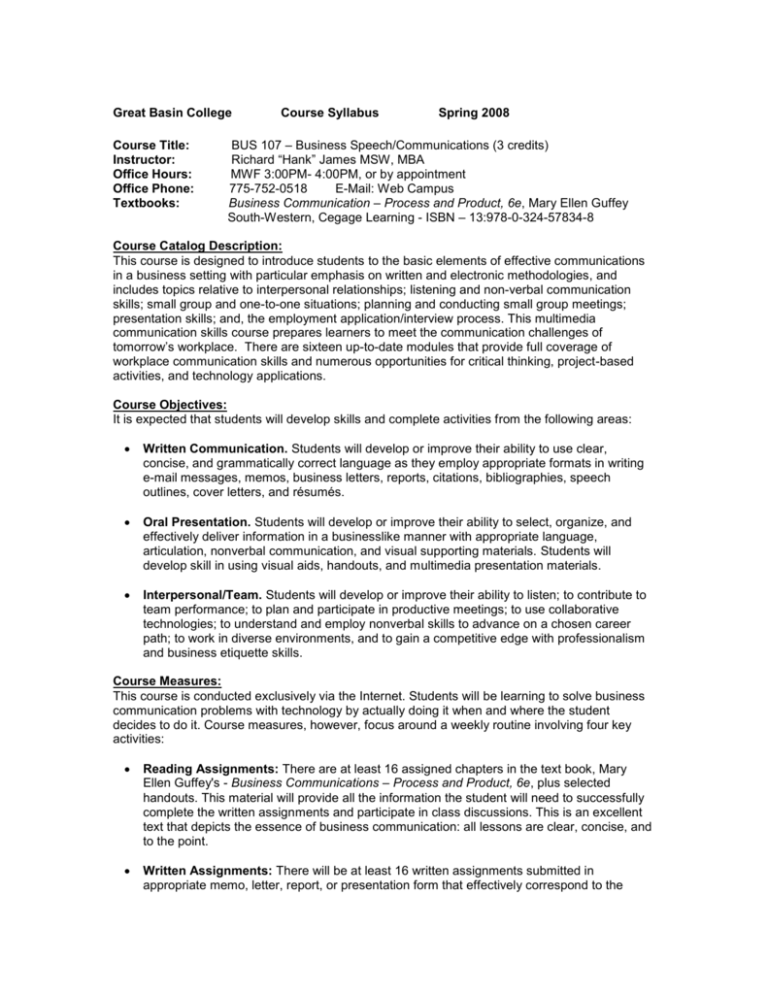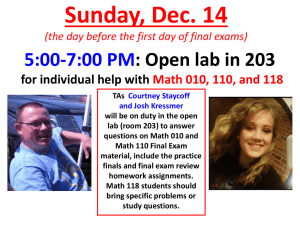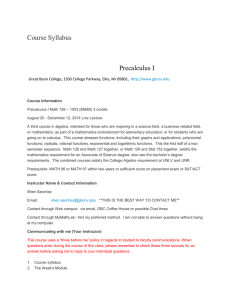BUS 107 I01 - Great Basin College
advertisement

Great Basin College Course Title: Instructor: Office Hours: Office Phone: Textbooks: Course Syllabus Spring 2008 BUS 107 – Business Speech/Communications (3 credits) Richard “Hank” James MSW, MBA MWF 3:00PM- 4:00PM, or by appointment 775-752-0518 E-Mail: Web Campus Business Communication – Process and Product, 6e, Mary Ellen Guffey South-Western, Cegage Learning - ISBN – 13:978-0-324-57834-8 Course Catalog Description: This course is designed to introduce students to the basic elements of effective communications in a business setting with particular emphasis on written and electronic methodologies, and includes topics relative to interpersonal relationships; listening and non-verbal communication skills; small group and one-to-one situations; planning and conducting small group meetings; presentation skills; and, the employment application/interview process. This multimedia communication skills course prepares learners to meet the communication challenges of tomorrow’s workplace. There are sixteen up-to-date modules that provide full coverage of workplace communication skills and numerous opportunities for critical thinking, project-based activities, and technology applications. Course Objectives: It is expected that students will develop skills and complete activities from the following areas: Written Communication. Students will develop or improve their ability to use clear, concise, and grammatically correct language as they employ appropriate formats in writing e-mail messages, memos, business letters, reports, citations, bibliographies, speech outlines, cover letters, and résumés. Oral Presentation. Students will develop or improve their ability to select, organize, and effectively deliver information in a businesslike manner with appropriate language, articulation, nonverbal communication, and visual supporting materials. Students will develop skill in using visual aids, handouts, and multimedia presentation materials. Interpersonal/Team. Students will develop or improve their ability to listen; to contribute to team performance; to plan and participate in productive meetings; to use collaborative technologies; to understand and employ nonverbal skills to advance on a chosen career path; to work in diverse environments, and to gain a competitive edge with professionalism and business etiquette skills. Course Measures: This course is conducted exclusively via the Internet. Students will be learning to solve business communication problems with technology by actually doing it when and where the student decides to do it. Course measures, however, focus around a weekly routine involving four key activities: Reading Assignments: There are at least 16 assigned chapters in the text book, Mary Ellen Guffey's - Business Communications – Process and Product, 6e, plus selected handouts. This material will provide all the information the student will need to successfully complete the written assignments and participate in class discussions. This is an excellent text that depicts the essence of business communication: all lessons are clear, concise, and to the point. Written Assignments: There will be at least 16 written assignments submitted in appropriate memo, letter, report, or presentation form that effectively correspond to the reading assignments. All written assignments must be delivered in Microsoft Word (or equivalent word processor) and submitted as attached files to e-mail messages. Students’ work is expected to reflect the ideas and techniques discussed in the text and meet professional business standards of grammar, punctuation, format, and style. Quizzes, Tests, & Exams: There will be at least 4 short subject matter quizzes from which student’s can measure content awareness within a specific chapter range. In addition, students will measure their retention of knowledge through three Unit level exams, and will end the course with a final cumulative exam. Peer Editing Review and Revision: Some assignments require students to collaborate with members of student’s Peer Editing Team (see below) for review prior to final revision and submission to the instructor. This interpersonal interaction gives students an opportunity to test out how well their message "reads" among peers, and to catch errors students might have otherwise missed prior to submission for a grade. This technique also enables students to read what their colleagues are writing, and to "share” best practices. * Peer Editing Team – During the first two weeks of the course, students will be assigned to a peer editing team of 2-3 members. Membership on these teams is intended to be a learning support group, as students work together on a number of key activities. Long Report: Appropriate application of acquired knowledge is the strongest measure in any academic environment. All weekly reports and written activities in this course are derived to give students real-life situations to which they can apply their knowledge. In addition to the weekly reports and activities, students will be required to select a project early in the course to research, design, manage, and document as a formal report to be submitted at the end of the course. This important project gives students the opportunity to learn and hone the writing skills they acquire during the course. Late assignments. Anything submitted late will be limited to a maximum score of 60 percent of the assignment’s total points. Course Completion Instructions: This course follows the traditional on-campus semester timeline and students should plan to complete the course within that timeframe. Should an emergency occur that would prevent the student from completing assignments on time, the student needs to contact the instructor. If a student elects to withdraw from the course at any time, he/she must contact the GBC Admissions Office. They will receive access instructions by mail if they are new students. Otherwise, students can use previous login instructions for GBC’s Web Campus on-line tool. All instructions, supplementary materials, tests, and discussion sessions are delivered to students online via GBC’s Web Campus site, or supplemental web sites prescribed by the instructor. Exams: There are three, non-cumulative, mandatory tests and one final cumulative exam provided as a review and measure for students in this course. Formal Report: Students are expected to complete one formal written report by the end of the course designed to introduce students to researching, writing, and managing, a large project. Assignments: All assignments will be appropriate to material covered in respective modules. Material will be presented to students through their assigned readings. All assignments, quizzes, and tests are submitted online. Students are NOT expected to come to GBC’s campus at any time. Information and assignment due-dates will be provided by the instructor on-line via Web Campus. The class schedule is designed for students to read course material during the first few days of the week, then, any assignments will be due for submission via Web Campus by 9:00PM on the following designated Sunday night. Students may communicate with the instructor and other students via e-mail, telephone, and/or through Web Campus. Technology Required: Students must have access to a computer with (preferably high-speed) Internet connection. Students can use the computer lab available at the High Tech Center on the Elko campus, labs at other GBC satellite campuses, or, use their personal computer. Course Outline: Unit 1: COMMUNICATION FOUNDATIONS. 1. Communicating in Today's Workplace. 2. Developing Team, Listening, and Etiquette Skills Unit 2: THE WRITING PROCESS. 4. Writing Process Phase 1: Analyze, Anticipate, and Adapt. 5. Writing Process Phase 2: Research, Organize, and Compose. 6. Writing Process Phase 3: Revise, Proofread, and Evaluate. Unit 3: BUSINESS CORRESPONDENCE. 7. E-mail Messages and Memos. 8. Positive Letters and Messages. 9. Persuasive and Sales Messages. 10. Negative Messages. Unit 4. REPORTS, PROPOSALS, AND PRESENTATIONS. 11. Business Report Basics. 12. Informal Business Reports. 13. Proposals and Formal Reports. 14. Business Presentations. Unit 5: EMPLOYMENT COMMUNICATION. 15. Resumes and Cover Messages. 16. Interviewing and Follow-up Course Grading: Business 107 - Spring 2008 Business Speech/Communications ASSIGNMENT 1.) Submit Introductory Activity 1-25-08 2.) Complete C.L.U.E. Proficiency Test Form A by 1-27-08 3.) Submit a brief proposal for Activity 2.9 4.) Take Dr. Guffey’s Listening Quiz on-line. 5.) Complete Activity 3.9 (Collaboration) 6.) Long Report Topic Due 7.) Submit answers to: Selecting Communications Channels – Activity 4.2 8.) Submit answers to: Audience Benefits and the “You” view – Activity 4.5 9.) Submit your solution for: Organizing Data - Activity 5.2 (Collaboration) 10.) Re-write and submit Sentence Length - Activity 5.16 11.) Analyze and revise the e-mail communication in Activity 6.4 12.) Revise and submit your solutions in Activity 6.9 13.) Long Report check-point regarding research and final topic. (Written) See Activity 12.10 14.) Submit your solution for Re-designing the Company’s Website -Activity 7.8 15.) Prepare and submit a Request for Information in Activity 8.6 (Collaboration) 16.) Prepare an appropriate solution to Persuasive Organizational Message Flowing Upward – Activity 9.15 (Collaboration) 17.) Submit your Long Report Outline per Activity 11.8 Points 15 50 15 15 40 25 15 15 40 15 15 15 2% 5% 2% 2% 4% 3% 2% 2% 4% 2% 2% 2% 15 15 40 2% 2% 4% 30 25 3% 3% 18.) Chapter 12 Quiz 19.) Chapter 13 Quiz 20.) Submit and outline for a 15 minute oral presentation to your peers using the information presented in Activity 14.11 21.) Submit your Resume according to instructions in Activity 15.9 22.) Complete Activity 16.3 – Building Interview Skills 23.) Complete C.L.U.E. Proficiency Post-test 43.) Long Report due Unit Test 1 Unit Test 2 Unit Test 3 Final Exam Total Points BUS 107 Spring 2008 (CLASS SCHEDULE: (Tentative 1-17-08) Due Dates Chapter Homework Assignments January 25 None “Listening” Activity 1.) Submit Introductory Activity by 1-25-08 January 27 February 3 Chapter 1 Communicating Read Chapter in Today’s and complete Workplace Web Activity 1.1 Chapter 2 Developing Team, Read both Listening, and chapters Etiquette Skills. Chapter 3 Communicating Across Cultures. 2.) Complete C.L.U.E. Proficiency Test Form A by 1-27-08 3.) Submit a brief proposal for Activity 2.9 4.) Take Dr. Guffey’s Listening Quiz on-line. 5.) Complete Activity 3.9 (Collaboration) Answer Chapter Review and Critical Thinking 6.) Long Report Topic Due questions for chapters 1,2, & 3. February 10 Unit 1 Test 7.) Submit answers to: Selecting Communications Channels – Activity 4.2 February 17 Chapter 4 Writing Process Phase 1: Read Chapter 4 Analyze, Anticipate, Adapt Chapter 5 Writing Process Phase 2: Research, Organize, 9.) Submit your solution for: Organizing Data - Activity 5.2 (Collaboration) February 24 Read Chapter 5 8.) Submit answers to: Audience Benefits and the “You” view – Activity 4.5 10.) Re-write and submit Sentence Length - Activity 15 15 2% 2% 15 15 15 50 100 75 75 75 150 1000 2% 2% 2% 5% 10% 8% 8% 8% 15% Compose 5.16 Chapter 6 Writing Process Phase 3: Revise, Proofread, Evaluate Read Chapter 6 March 9 Unit 2 Test Answer Chapter Review and Critical Thinking questions for Chapters 4,5 & 6. March 16 Chapter 7 E-mail Messages and Read both Memos. Chapters Chapter 8 Positive Letters and Messages. March 2 March 24 11.) Analyze and revise the e-mail communication in Activity 6.4 12.) Revise and submit your solutions in Activity 6.9 Chapter 9 Persuasive and Sales Read both Messages Chapters Chapter 10 Negative Messages. 13.) Long Report checkpoint regarding research and final topic. (Written) See Activity 12.10 14.) Submit your solution for Re-designing the Company’s Website Activity 7.8 15.) Prepare and submit a Request for Information in Activity 8.6 (Collaboration) 16.) Prepare an appropriate solution to Persuasive Organizational Message Flowing Upward – Activity 9.15 (Collaboration) March 30 Unit 3 Test Answer Chapter Review and Critical Thinking questions for Chapters 7,8,9 & 10 April 6 Chapter 11 Business Report Basics Read Chapter 11 April 13 Chapter 12 Informal Business Reports Read Chapter 12 18.) Chapter 12 Quiz April 20 Chapter 13 Proposals and Read Chapter 13 19.) Chapter 13 Quiz Formal Reports April 27 Chapter 14 Business Presentations 20.) Submit and outline for a 15 minute oral presentation Read Chapter 14 to your peers using the information presented in Activity 14.11 May 5 Chapter 15 Read Chapter 15 21.) Submit your Resume None 17.) Submit your Long Report Outline per Activity 11.8 Resumes and Cover Letters May 12 May 19 according to instructions in Activity 15.9 22.) Complete Activity 16.3 – Building Interview Skills Chapter 16 Interviewing and Follow-up Read Chapter 16 Final Exam Cumulative Review of Learning Objectives 23.) Complete C.L.U.E. Proficiency Post-test 24.) Long Report due









